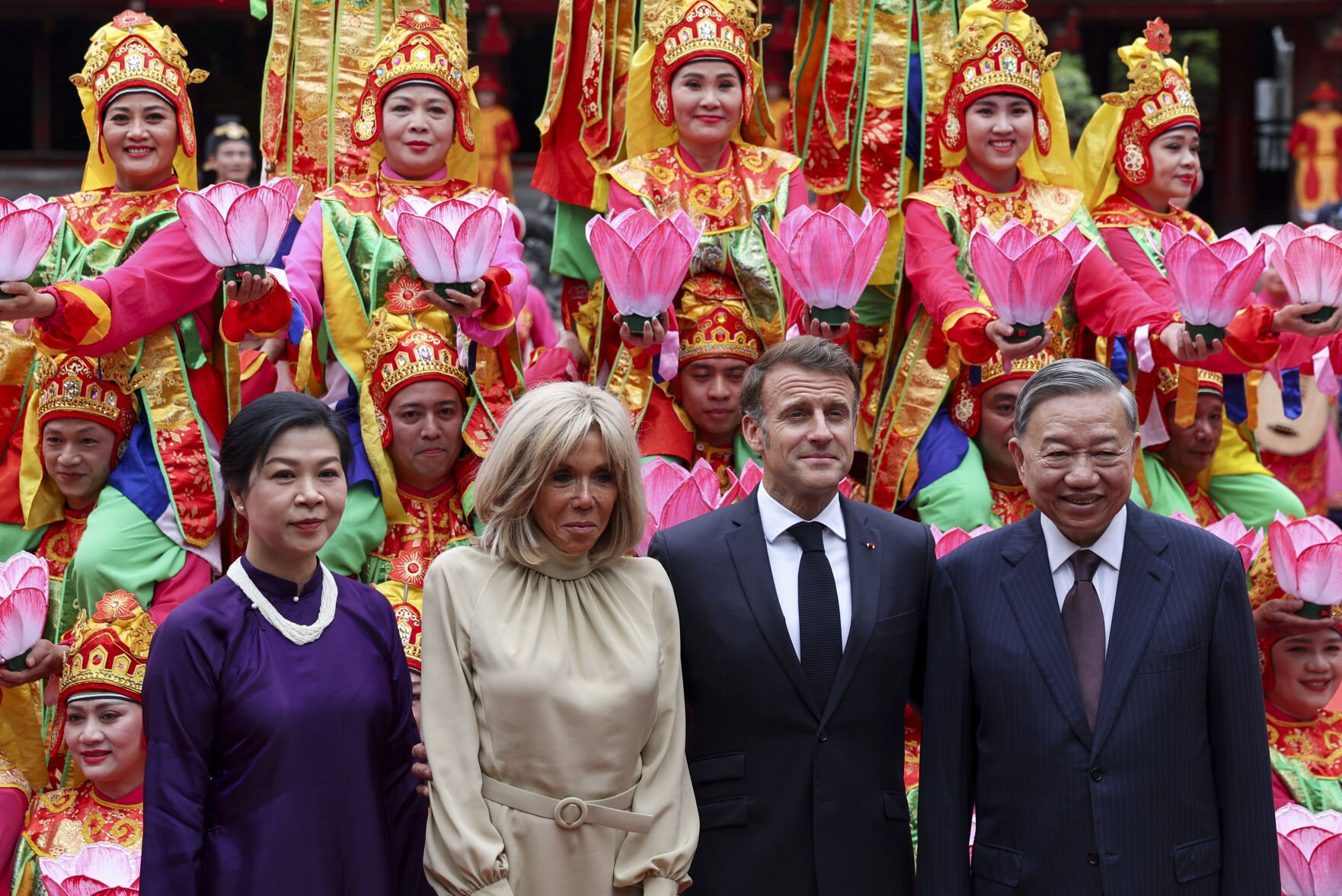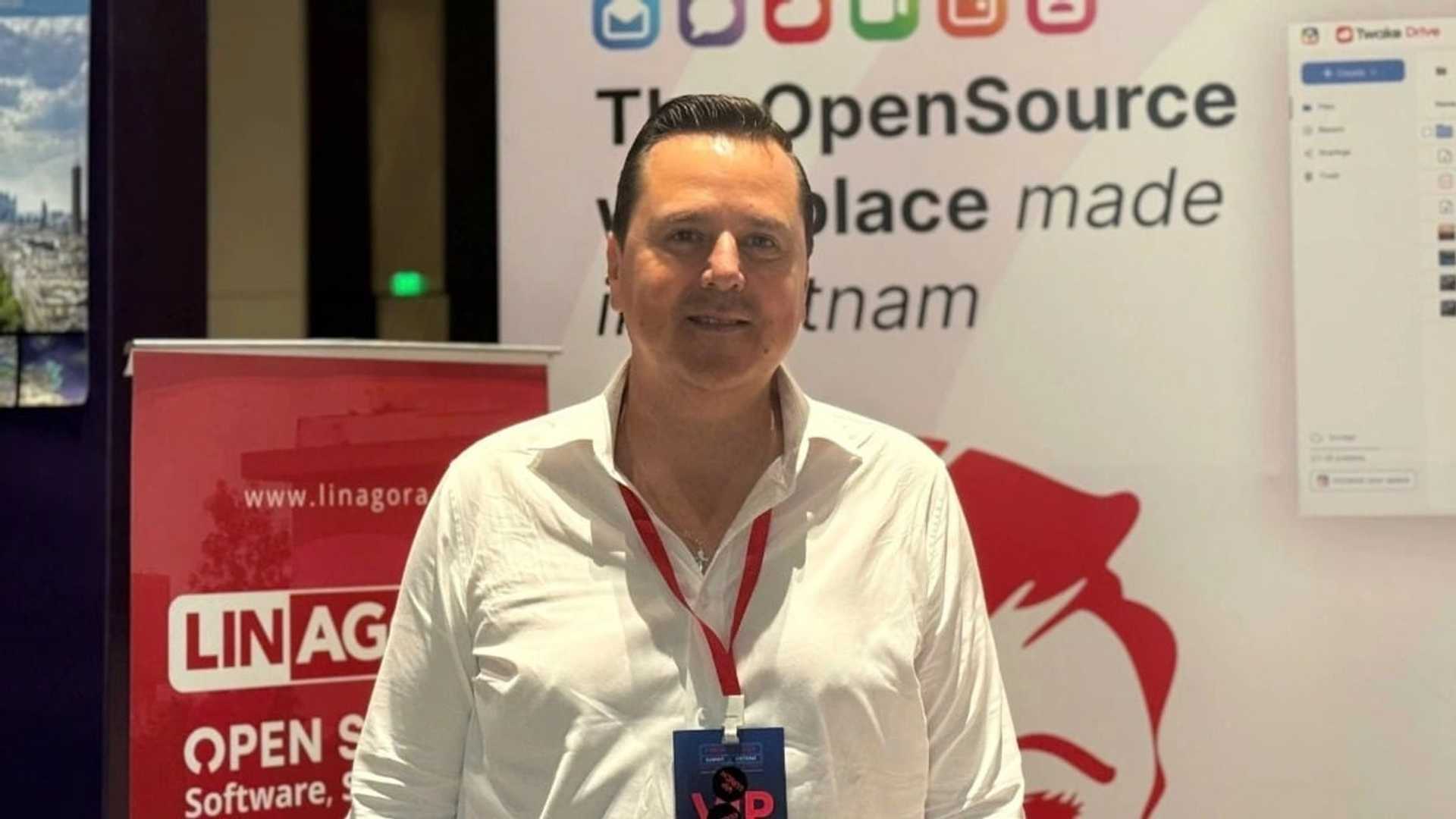French expert: AI is truly a golden opportunity for Vietnam to become ...
Is "open source AI" the key? Dan Tri reporter interviewed Mr. Alexandre Zapolsky, Chairman and co-founder of Linagora - a French open source software company with 25 years of experience in France and 10 years of presence in Vietnam. From high-level French-Vietnamese cooperation commitments to AI mastery and national positioning strategies, his sharing opens up many valuable and practical perspectives. Sir, in the context of Vietnam and France strengthening strategic cooperation, the recent visit of the French President is expected to create strong impetus for many fields, including science and technology. In your opinion, what specific cooperation opportunities in the field of AI between the two countries can this visit open up?
President Emmanuel Macron, his wife and members of the French delegation stroll around Hoan Kiem Lake (Photo: Thanh Dong). - This visit is highly anticipated by the Vietnamese people and all those who are nurturing the France-Vietnam relationship. President Macron, as usual, always pays special attention and commits to supporting the technology and science sectors. As evidence, he chose to visit students at the University of Science and Technology of Hanoi (USTH), a symbol of French-Vietnamese cooperation and a university with top training quality in Vietnam. Although the President was unable to attend the French Tech Summit in Ho Chi Minh City (taking place on May 27), we were honored to welcome the Minister in charge of Artificial Intelligence and Digital, Clara Chappaz. As Co-Chair of the International Cooperation Committee of the French Digital Sector Strategy Committee, at this event, I participated in a roundtable discussion and proposed the idea of building a Franco-Vietnamese alliance for digital sovereignty and Artificial Intelligence. I was delighted that the representative of VNPT Group responded to this proposal.
Collaboration Opportunities in AI
Mr. Alexandre Zapolsky (left cover) took a photo with Minister for Artificial Intelligence and Digital Clara Chappaz (yellow shirt) at the French Technology Summit (Photo: CTV). I also boldly make a commitment: At the second French Tech Summit next year, we will jointly present concrete achievements of cooperation between France and Vietnam in the field of AI. Linagora and VNPT have publicly committed to working closely together to realize this goal. All of this became possible thanks to the French President’s visit to Vietnam, following the previous visit to France by General Secretary To Lam. It can be seen that there is an extremely strong political cooperation between the senior leaders of the two countries and this will certainly create specific impacts, promoting substantive cooperation between businesses of the two sides.
Accessing Advanced AI Technologies
From the commitments and cooperation orientations at the highest level after the French President's visit, what breakthrough potential do you see for Vietnam to access and master advanced AI technologies from France, especially in industries where France has strengths? - France currently has a significant comparative advantage over Vietnam in the field of supercomputers. We have invested many years ago in supercomputer systems, so France has abundant GPU (Graphics Processing Unit) resources. I know that Vietnam is lacking in computing power and GPU. This is a huge area for cooperation.
France can support Vietnamese researchers in accessing and using supercomputing resources, especially for developing open-source AI models, or at least open science. The second point where I think we can cooperate effectively is to jointly implement scientific and technical research and development projects in the field of AI platform models. In France, we have built a community called OpenLLM France, which is currently the largest French-language AI research community, bringing together 1,200 engineers and scientists to work together to create truly open AI, of which AI Lucie is the first. We are willing to share these valuable experiences - from training a platform model from scratch - with our Vietnamese colleagues, so that Vietnam can build and master its own national AI model, ensuring digital sovereignty.
Overcoming Barriers in AI Development
So, in your opinion, what are the main barriers that Vietnam needs to overcome to truly create a revolution in the field of AI? - I think Vietnam needs to move from a model where individuals are simply AI users for personal purposes (including at work), to a stage where AI deeply penetrates businesses. Businesses must proactively apply AI models to transform themselves and improve productivity. This is a necessary paradigm shift.
Second, it is necessary to strongly communicate to the business community that companies that do not proactively research and apply AI will face the risk of falling behind or even disappearing, just like those businesses that ignored the Internet in the early 2000s. Back then, many companies thought they didn’t need a website, didn’t need an online store, didn’t even need email. And as a result, most of them ceased to exist.

Utilizing Open Source for AI Development
What do you think about utilizing open source for AI development in Vietnam? Apart from the cost and cooperation aspects, how can mastering and developing these open source platforms help Vietnam position itself on the global AI map? - In my opinion, truly open AI is the only way for latecomers to catch up with the superpowers that have invested billions of dollars in this field. Therefore, truly open AI is a golden opportunity for Vietnam.
I emphasize the concept of "truly open AI" because there is a big difference with what people often call open source AI but is not really open, for example AIs from Meta or DeepSeek. An AI is considered “truly open” when it meets three criteria: Freedom of Use: Users are free to exploit AI. Method transparency: AI training methods must be fully public. Access to training data: Training data must be provided under a free license, allowing model retraining.

Strategic Support for Vietnamese AI Startups
In order for Vietnamese AI startups to master technology and compete fairly in the international market, what strategic support do they need from the Government, organizations, as well as cooperation with French technology enterprises? - We need to “prime the pump” (amorcer la pompe) – that is, create the initial push to launch projects. Usually, State intervention is essential, possibly through public laboratories or building funding and subsidy mechanisms between the Government and AI startups.
I am not an expert on the specific situation in Vietnam, but I am not sure that Vietnam has had many similar support programs as in France. In France, we have the "France 2030" program, a very successful initiative with many components for funding innovation. For example, the OpenLLM France community that I mentioned also receives resources from here. This is a valuable experience that we can share with our Vietnamese colleagues, including at the governmental level between the two countries.
Future AI Trends and Collaboration
In your opinion, which AI trends will have the strongest impact on Vietnam's socio-economic development in the future? And how can France accompany Vietnam in forecasting and mastering these trends? - I believe one of the biggest changes that AI will bring is in collaboration. The way businesses work will change completely. I imagine in the future, we will no longer write emails, online meetings like this will be automatically recorded and converted into text stored on your personal drive, even with an automatic summary of the exchange content.

Fostering Trust through AI
Apart from the technological aspect, in your opinion, what political, human and cultural factors need to be strengthened so that Vietnam can fully exploit the potential of AI and international cooperation, especially with France? - I think a key factor is that AI must be seen as a trust-building factor. Right now, in many countries, AI is creating a lot of questions and doubts. Interestingly, this doubt comes from both users and regulators. The fact is, AI is a trend that has already started and will never stop.
We need to turn it into a tool to bring us closer together, to strengthen the trust between people, users and the government. This will allow Vietnam to exploit the full potential of AI. Interestingly, Vietnamese people are now using AI a lot in their personal lives. AI has crept into their lives. People are using AI widely, but mainly in the personal sphere or to improve work performance.
According to Mr. Alexandre, AI is a trend that has started and will never stop. We need to turn it into a tool to bring us closer together (Photo: Contributor). This potential needs to be expanded and applied more strongly, including in Vietnam's state administrative agencies, to modernize and improve operational efficiency. AI must become a factor in strengthening trust between the people and the government. That is a hopeful message that I want to convey.
Linagora's Contribution to AI Development in Vietnam
Sir, what specific activities does Linagora currently have that contribute to AI development in Vietnam? - First of all, as










